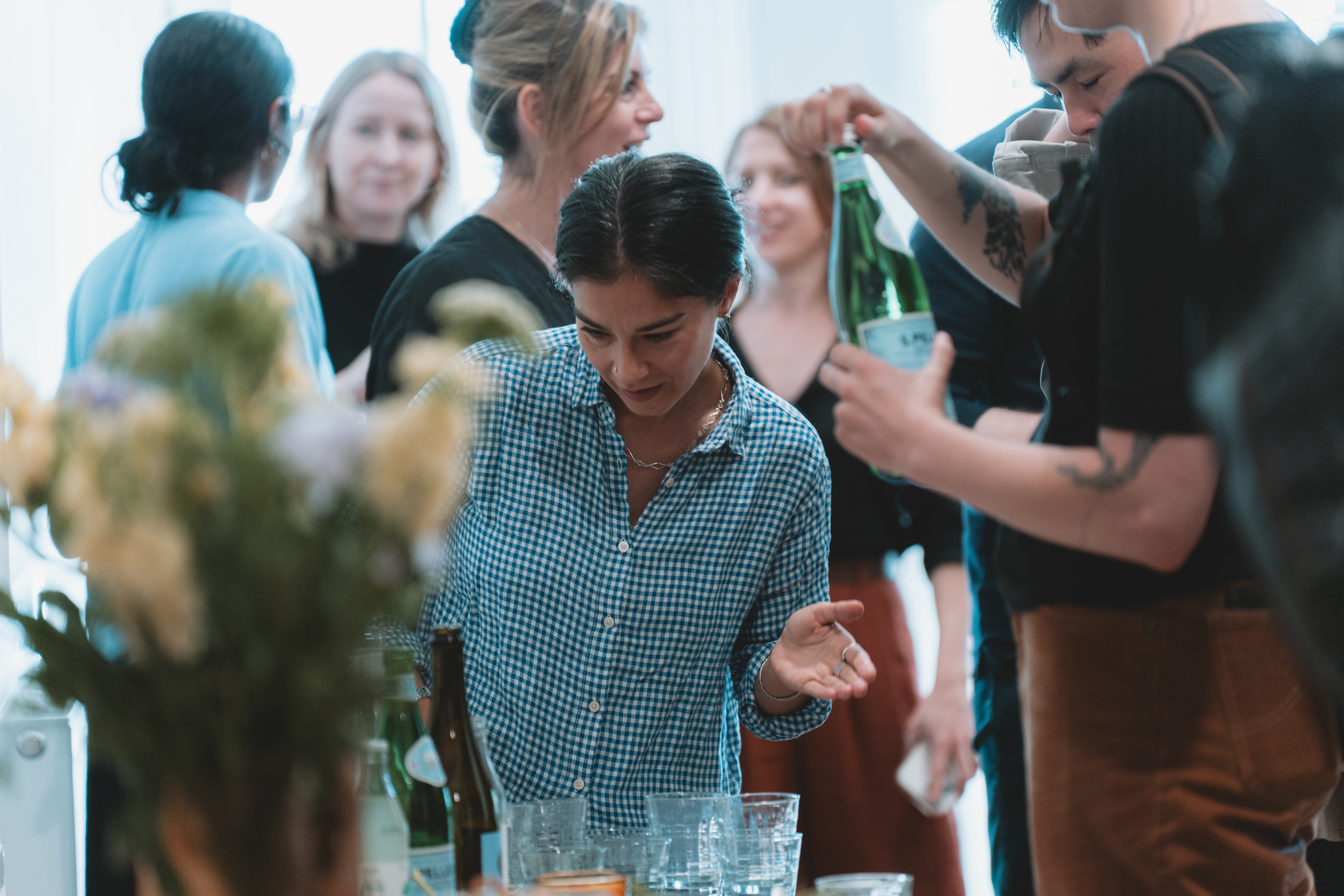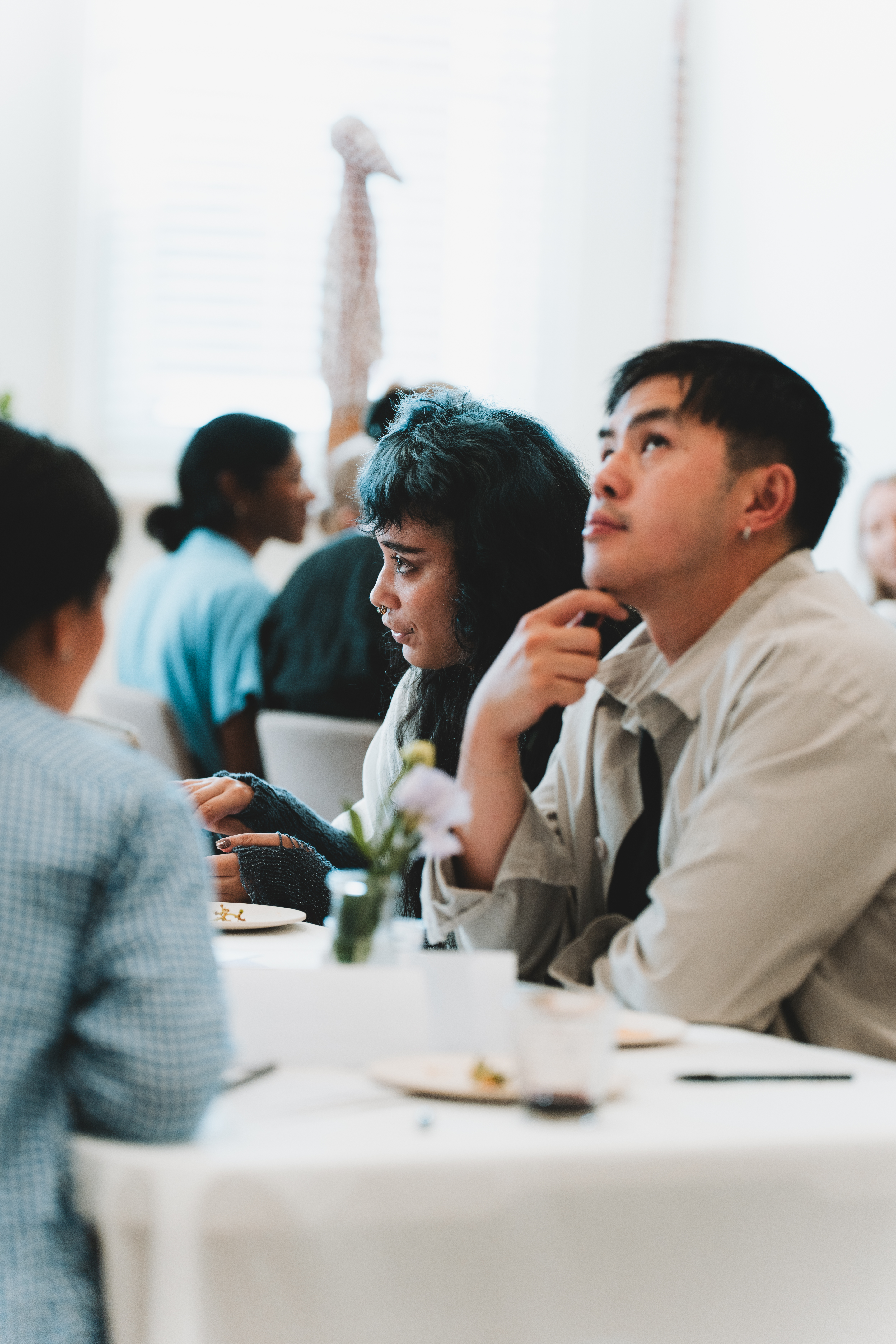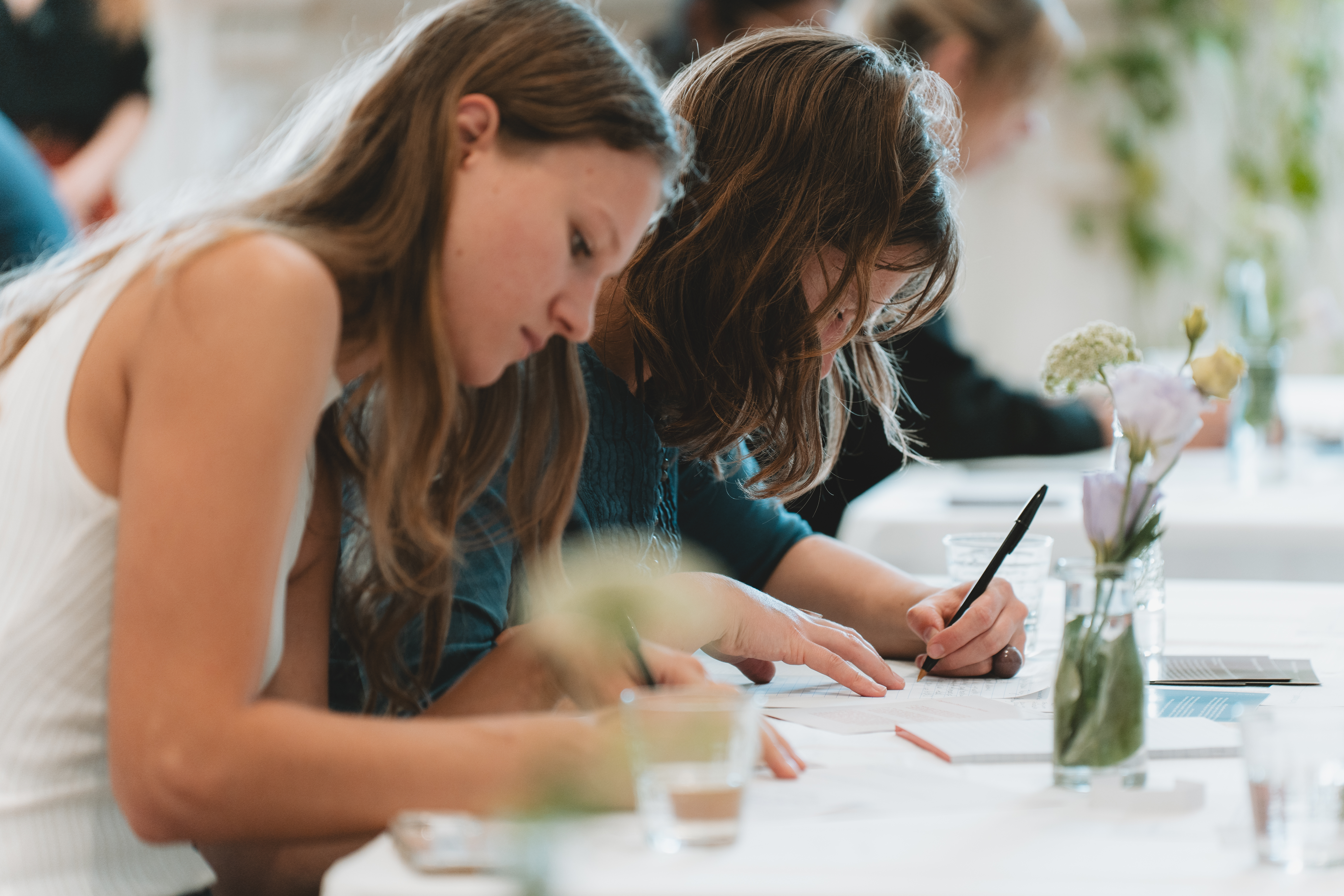Page Coming Soon!
Stay tuned...
Nostos
A lunch salon series by AnthroprospectiveNostos is an intimate new lunch salon series by Anthrōprospective, launching at Cam’s Kiosk in the Abbotsford Convent. Inspired by the ancient Greek concept of nostos [νόστος]—a longing to return home—this gathering invites us back: to community, to place, to self, and to one another. In a time of disconnection, Nostos is a return to slow, thoughtful conversation shared over a warm meal.
This inaugural winter session will be grounded on the theme of rites of passage—those often unspoken transitions that shape our lives. We’ll explore how these rituals help us make sense of change, structure the world around us, and guide us through our own experiences of becoming. Through an anthropological lens, we’ll hold space for personal reflection, shared stories, and social insight.
Whether you’re curious about anthropology, seeking connection over good food and drinks or simply drawn to deep conversation, Nostos offers a place at the table. Come as you are, bring your thoughts, your appetite, and your warmth.
*Ticket price includes set menu lunch and two glasses of wine. Please indicate your dietary requirements at booking.
Science of Self Workshop
An Anthroprospective and Archleys collaboration
About this Event
Unlocking New Ways of Seeing Yourself and the World Around You
In their first-ever collaboration, Anthroprospective and Archleys came together to host the inaugural Science of Self workshop - an immersive gathering that brought together our communities for an evening of thoughtful dialogue, creative exploration, and collective reflection.
Set in the calm, light-filled rooms of the White House in St Kilda, generously offered by our friends at the Small Giants Academy, Science of Self emerged to the public. It was a chance to play, to pause, and to open up conversations that are often left unsaid.
Part reflective tool, part conversation catalyst, Science of Self is a work-in-progress (soon to be launched in 2025), a game designed to help people make sense of themselves and the world around them through the lens of social theory, empathy, and systems thinking. At this workshop, we invited our community to test the game, offer feedback, and help shape its next chapter. Together, we explored what it means to translate big ideas into accessible, human moments.
The evening wove together elements of anthropology, social science, psychology, design, facilitation, and embodied learning. It created space for stillness and surprise, for insight and laughter, for thoughtful connection with strangers and new perspectives on familiar things. What emerged was more than just feedback on our prototype; it was the beginning of a community of practice - one that values depth over speed, curiosity over certainty, and dialogue over division.
We're so grateful to everyone who showed up with open minds and generous spirits, and to Small Giants Academy for creating the conditions for this kind of work to take root.
This is just the beginning and we can’t wait to share it with you.




"Our work now is not to create manifold or totalizing blueprints for new worlds, because I think we tend to repeat the dynamics of the world we're in, in the one we're envisioning. Sometimes the future is just a colonial attempt of the present. So I would say that what we need to do is to stay with the trouble, meet in places where we can be met by the world in return, hopefully defeated in our attempts to understand it. Where confusion becomes a form of research inquiry. Confusion becomes a philosophy, an epistemology. And maybe there, maybe there, we might learn about the world and about ourselves anew. There is no guarantee. But that's the invitation of the moment."
— Bayo Akomolafe


"One of the sayings in our country is Ubuntu – the essence of being human. Ubuntu speaks particularly about the fact that you can’t exist as a human being in isolation. It speaks about our interconnectedness. You can’t be human all by yourself, and when you have this quality – Ubuntu – you are known for your generosity. We think of ourselves far too frequently as just individuals, separated from one another, whereas you are connected and what you do affects the whole world. When you do well, it spreads out; it is for the whole of humanity."
— Desmond Tutu
— Desmond Tutu




“The purpose of anthropology is to make the world safe for human differences.”
- Ruth Benedict

Early Access via Patreon!
Want the juicy anthropological goodness before everyone else? Our Patrons get first dibs on all our 'Exploring the Intersection of Anthropology, Ethics and Creativity' chats! For just $3 a month (less than your fancy coffee), you can be the anthropology insider who knows all the things first. Not ready to commit? No worries - just keep watching this space like a hawk. We'll release everything here eventually!
Otherwise, sign up to our Patreon here.
We appreciate your support!!
In Search of the Modern Agora; can scholarship speak to a divided world?
Words: Courtney Boag
Images: ‘The Death of Socrates’ - oil painting by Jacques-Louis David (1787)
8 November, 2024
“The future of effective truth-telling lies not in asserting absolute truths, but in creating spaces where multiple perspectives can be examined thoughtfully and where questioning leads not to division, but to deeper understanding.”
Courtney Boag

When Socrates was condemned to death in 399 BCE for "corrupting the youth" of Athens, he wasn't merely a victim of political persecution – he represented a fundamental tension that still resonates today: the challenge of bridging scholarly inquiry with public discourse. This ancient conflict between truth-telling and public reception mirrors the modern academy's struggle to communicate effectively with broader society, particularly in the social sciences. Through examining this parallel, we can better understand how to foster meaningful dialogue between academia and the public without sacrificing rigour or amplifying polarisation.
The modern academy faces a paradoxical crisis of communication. Despite producing valuable research across disciplines, universities increasingly function as isolated (and we might add, privatised) ivory towers, their insights rarely penetrating public consciousness in meaningful ways. This isolation becomes particularly problematic when we consider G.K. Chesterton's famous principle about social reform – now known as Chesterton's Fence. The principle suggests that reforms should not be made until we fully understand why existing traditions and structures were established in the first place. Yet how can society make informed decisions about change when the very research that might illuminate these understandings remains restricted within academic circles?
This communication gap manifests most visibly when academic research challenges established narratives or popular beliefs. The recent "Dark Emu" debate in Australia provides a compelling illustration. When anthropologist Peter Sutton and archaeologist Keryn Walsh published their research (Farmers or Hunter-gatherers? The Dark Emu Debate) which challenged certain historical interpretations, the resulting public discourse quickly became polarised. Rather than fostering nuanced discussion about why particular historical narratives had evolved and what purposes they served – as Chesterton's Fence would advocate – their work was often reduced to binary positions that served various political agendas.
The parallel with Socrates proves instructive here. His approach to questioning accepted truths wasn't simply to assert alternative facts or hastily tear down established beliefs, but to engage citizens in dialogue that encouraged examination of their own assumptions and the foundations of their society. His method, though ultimately leading to his death, demonstrated a crucial principle: effective truth-telling requires not just the transmission of knowledge, but the creation of spaces where multiple truths can be examined and discussed productively.
Modern academia would do well to learn from both Socrates and Chesterton. The current "deficit model" of academic communication must evolve into what might be called a "dialogue model," where researchers engage with the public as active participants rather than passive recipients. This approach acknowledges that before we attempt to dismantle or modify social structures, we must first understand their original purpose and current function through meaningful dialogue between experts and the broader public.
The stakes in this endeavour are significant. When academic research remains isolated from public discourse, society not only loses access to valuable insights that could inform policy, social change, and individual understanding, but a more insidious transformation occurs. The absence of meaningful dialogue between academia and everyday life gradually reshapes societal values and behaviours, creating what might be called an 'anti-intellectual drift'. This drift manifests as declining public interest in scholarly thought, erosion of critical thinking skills, and growing suspicion of expert knowledge. As this gap widens, society increasingly makes sweeping social changes without the benefit of deep analytical thinking or historical understanding – precisely the scenario that Chesterton's Fence warns against. We risk dismantling social structures whose complex purposes we've forgotten how to examine. Conversely, when research does enter public discourse without adequate translation or context, it risks being misinterpreted or weaponised for political purposes, as seen in the Dark Emu debate.
Creating bridges between academic knowledge and public discourse requires concrete changes in how academia approaches public engagement. Universities must value and reward public communication alongside traditional academic metrics. However, this engagement must go beyond simple knowledge transmission to facilitate deeper discussions about the implications of social change. We need new platforms for dialogue that function as modern versions of the ancient agora – spaces where academic insights can meet public discourse in productive ways, and where the wisdom embedded in existing social structures can be carefully examined before being modified or discarded.
The ultimate goal of this transformation extends beyond mere knowledge dissemination. When academic research effectively engages with public discourse, it has the potential to help society grapple with complex issues more productively. Rather than contributing to polarisation or hasty social reform, social science research can help illuminate our common humanity and foster more nuanced understanding of different perspectives while also helping us better understand the potential consequences of social change.
This careful approach to social change and public discourse becomes increasingly vital in our rapidly evolving society. The pace of technological and social change often pressures us to act quickly, but Chesterton's Fence reminds us of the importance of understanding before acting. Academic research, properly communicated and discussed in the public sphere, can help provide this crucial understanding.
Socrates died for his commitment to questioning accepted truths, but his legacy lives on in the enduring value of dialogue and enquiry. Modern academia need not face such dramatic consequences, but it must show similar courage in bridging the gap between scholarly knowledge and public understanding. The future of effective truth-telling lies not in asserting absolute truths or hastily dismantling social structures, but in creating spaces where multiple perspectives can be examined thoughtfully and where questioning leads not to division, but to deeper understanding.
Through this approach, we might discover that our common humanity lies not in shared answers, but in our shared questions and our collective responsibility to understand the implications of social change. In an era of increasing polarisation and rapid transformation, this may be the most valuable truth of all.
References
Schalet, A., Tropp, L and L, Troy, 2020, Making Research Usable Beyond Academic Circles: A Relational Model of Public Engagement, Analyses of Social Issues and Public Policy, vol. 20, no. 1, 2020, pp. 336--35.
Sutton, P and Walsh, K, 2021, Farmers or Hunter-gatherers? The Dark Emu Debate, Melbourne University Press.
ABC Listen ‘The Dark Emu Debate’
Stephen Bennetts reviews Farmers or Hunter-gatherers? by Petter Sutton and Keryn Walshe
The modern academy faces a paradoxical crisis of communication. Despite producing valuable research across disciplines, universities increasingly function as isolated (and we might add, privatised) ivory towers, their insights rarely penetrating public consciousness in meaningful ways. This isolation becomes particularly problematic when we consider G.K. Chesterton's famous principle about social reform – now known as Chesterton's Fence. The principle suggests that reforms should not be made until we fully understand why existing traditions and structures were established in the first place. Yet how can society make informed decisions about change when the very research that might illuminate these understandings remains restricted within academic circles?
This communication gap manifests most visibly when academic research challenges established narratives or popular beliefs. The recent "Dark Emu" debate in Australia provides a compelling illustration. When anthropologist Peter Sutton and archaeologist Keryn Walsh published their research (Farmers or Hunter-gatherers? The Dark Emu Debate) which challenged certain historical interpretations, the resulting public discourse quickly became polarised. Rather than fostering nuanced discussion about why particular historical narratives had evolved and what purposes they served – as Chesterton's Fence would advocate – their work was often reduced to binary positions that served various political agendas.
The parallel with Socrates proves instructive here. His approach to questioning accepted truths wasn't simply to assert alternative facts or hastily tear down established beliefs, but to engage citizens in dialogue that encouraged examination of their own assumptions and the foundations of their society. His method, though ultimately leading to his death, demonstrated a crucial principle: effective truth-telling requires not just the transmission of knowledge, but the creation of spaces where multiple truths can be examined and discussed productively.
Modern academia would do well to learn from both Socrates and Chesterton. The current "deficit model" of academic communication must evolve into what might be called a "dialogue model," where researchers engage with the public as active participants rather than passive recipients. This approach acknowledges that before we attempt to dismantle or modify social structures, we must first understand their original purpose and current function through meaningful dialogue between experts and the broader public.
The stakes in this endeavour are significant. When academic research remains isolated from public discourse, society not only loses access to valuable insights that could inform policy, social change, and individual understanding, but a more insidious transformation occurs. The absence of meaningful dialogue between academia and everyday life gradually reshapes societal values and behaviours, creating what might be called an 'anti-intellectual drift'. This drift manifests as declining public interest in scholarly thought, erosion of critical thinking skills, and growing suspicion of expert knowledge. As this gap widens, society increasingly makes sweeping social changes without the benefit of deep analytical thinking or historical understanding – precisely the scenario that Chesterton's Fence warns against. We risk dismantling social structures whose complex purposes we've forgotten how to examine. Conversely, when research does enter public discourse without adequate translation or context, it risks being misinterpreted or weaponised for political purposes, as seen in the Dark Emu debate.
Creating bridges between academic knowledge and public discourse requires concrete changes in how academia approaches public engagement. Universities must value and reward public communication alongside traditional academic metrics. However, this engagement must go beyond simple knowledge transmission to facilitate deeper discussions about the implications of social change. We need new platforms for dialogue that function as modern versions of the ancient agora – spaces where academic insights can meet public discourse in productive ways, and where the wisdom embedded in existing social structures can be carefully examined before being modified or discarded.
The ultimate goal of this transformation extends beyond mere knowledge dissemination. When academic research effectively engages with public discourse, it has the potential to help society grapple with complex issues more productively. Rather than contributing to polarisation or hasty social reform, social science research can help illuminate our common humanity and foster more nuanced understanding of different perspectives while also helping us better understand the potential consequences of social change.
This careful approach to social change and public discourse becomes increasingly vital in our rapidly evolving society. The pace of technological and social change often pressures us to act quickly, but Chesterton's Fence reminds us of the importance of understanding before acting. Academic research, properly communicated and discussed in the public sphere, can help provide this crucial understanding.
Socrates died for his commitment to questioning accepted truths, but his legacy lives on in the enduring value of dialogue and enquiry. Modern academia need not face such dramatic consequences, but it must show similar courage in bridging the gap between scholarly knowledge and public understanding. The future of effective truth-telling lies not in asserting absolute truths or hastily dismantling social structures, but in creating spaces where multiple perspectives can be examined thoughtfully and where questioning leads not to division, but to deeper understanding.
Through this approach, we might discover that our common humanity lies not in shared answers, but in our shared questions and our collective responsibility to understand the implications of social change. In an era of increasing polarisation and rapid transformation, this may be the most valuable truth of all.
References
Schalet, A., Tropp, L and L, Troy, 2020, Making Research Usable Beyond Academic Circles: A Relational Model of Public Engagement, Analyses of Social Issues and Public Policy, vol. 20, no. 1, 2020, pp. 336--35.
Sutton, P and Walsh, K, 2021, Farmers or Hunter-gatherers? The Dark Emu Debate, Melbourne University Press.
Further Resources
ABC Listen ‘The Dark Emu Debate’
Stephen Bennetts reviews Farmers or Hunter-gatherers? by Petter Sutton and Keryn Walshe
